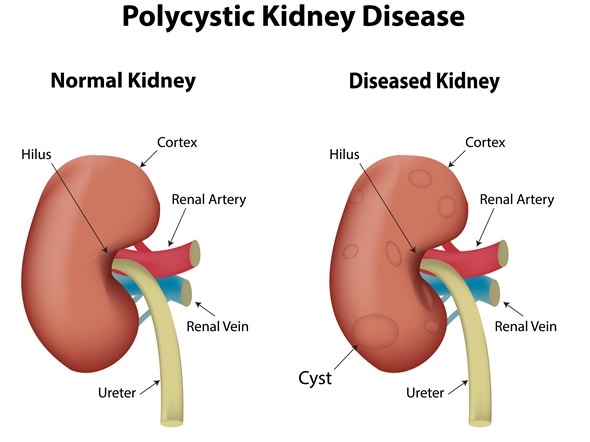A kidney cyst is a swelling filled with watery fluid that forms on one or both of the kidneys.
Kidney cysts are round, have a thin, clear wall and range in size from microscopic to around 5 cm in diameter.
These cysts can be associated with serious conditions that lead to impaired kidney function, but usually they are what is referred to as simple kidney cysts, which do not tend to cause complications.

Since symptoms are rare, a person will not usually know they have a kidney cyst and it is often detected by accident, when a scan or test for something else is performed. Simple kidney cysts are more likely to develop as a person ages. Approximately one quarter of people who develop these cysts are 40 years or older and around half are 50 years or older.
A complex kidney cyst is a cyst that has a more irregular shape or thicker walls than a simple cyst. Generally, the larger and more complex the cyst is, the greater the risk of it turning cancerous. Complex cysts are therefore carefully monitored and removed, if required.
Causes
The kidneys are comprised of tiny blood vessels that transport blood to approximately one million filtering tubes referred to as nephrons. A cyst arises when one of these tubes expands, but the exact reason the tube expands is not yet known.
Symptoms
Although kidney cysts do not usually cause symptoms, some may cause a dull pain in the back or upper abdomen if they grow large enough.
Occasionally, they become infected, in which case a person may develop a fever, as well as suffering from pain and tenderness.
They can also cause severe pain in the back or side if they burst. A cyst that blocks the normal flow of urine may cause the kidney to swell, which is referred to as hydronephrosis.
Treatment
If a simple kidney cyst is causing symptoms or obstructing urine flow, it may need to be treated.
Under ultrasound guidance, the cyst is punctured using a long needle and drained. This is called sclerotherapy. This procedure is usually carried out on an out-patient basis and does not require overnight stay in the hospital.
In some cases, where a cyst is large enough, a procedure called laparoscopy may be required to remove it.
A small tube with a camera attached at one end (a laparoscope) is used to locate the cyst and a surgeon drains and then removes or burns the cyst to prevent it from reoccurring.
Sources
- www.kidney.org.uk/…/
- www.mayoclinic.org/…/con-20035205
- https://www.kidney.org/atoz/content/simple-kidney-cysts
- http://www.bhdsyndrome.org/for-families/kidney/kidney-cysts/
Further Reading
- All Kidney Cyst Content
- Simple Kidney Cysts vs Polycystic Kidney Disease
- Diagnosing Kidney Cysts
- Kidney Cyst Removal
Last Updated: Feb 26, 2019

Written by
Sally Robertson
Sally has a Bachelor's Degree in Biomedical Sciences (B.Sc.). She is a specialist in reviewing and summarising the latest findings across all areas of medicine covered in major, high-impact, world-leading international medical journals, international press conferences and bulletins from governmental agencies and regulatory bodies. At News-Medical, Sally generates daily news features, life science articles and interview coverage.
Source: Read Full Article
